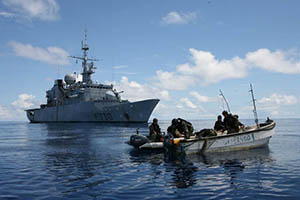Prevention and protection against risks of maritime piracy
 Various measures have been put in place to combat acts of maritime piracy. One of the main initiatives comes from the States themselves, which deploy Embarked Protection Teams (EPE). The second is the European naval operation: the European Union Naval Force Somalia (EUNAVFOR).
Various measures have been put in place to combat acts of maritime piracy. One of the main initiatives comes from the States themselves, which deploy Embarked Protection Teams (EPE). The second is the European naval operation: the European Union Naval Force Somalia (EUNAVFOR).
Other initiatives include Operation Atalanta, NATO's Ocean Shield missions, the Combined Task Force (CTF), which has set up a security corridor, and the IRTC (International Recommended Transit Corridor), designed to escort vulnerable vessels.
Ship owners, on their part, have called on security and defense service companies to develop protective measures (Best Management Practice) supported by the International Maritime Organization.
There is no doubt that the measures taken to prevent and protect against the risks of maritime piracy have achieved good results since 2019, with a reduction in the number of attacks.
Nevertheless, the situation remains worrying in all of the world's hotspots with the persistence of various mafia groups likely to organize terrorist attacks, which continues to worry ship owners. For instance:
- although contained, piracy in the Indian Ocean remains unchecked,
- the Gulf of Guinea is still exposed to attacks by organized and violent pirates,
- although opportunistic and less violent than that practiced in other areas, piracy continues to plague Southeast Asia.
Protection against risks of maritime piracy: The legal framework
From a legal standpoint, it is important to refer to the recent provisions pertaining to maritime piracy without going into all the details of legislation:
- the 1982 Montego Bay Convention (Jamaica) which defines maritime zones according to their distance from the coastal State. The zones closest to the coast are placed under the territorial sovereignty of the State (internal waters, territorial sea, archipelagic waters); the more remote zones are subject to the rules of international law,
- the Convention for the Suppression of Unlawful Acts against the Safety of Maritime Navigation, signed in Rome on 10 March 1988. The acts mentioned in this document do not expressly fall within the definition of piracy, but involve the safety of maritime navigation. The Convention, therefore, extends its scope to include maritime terrorism.
Provisions governing the safety of goods and people at sea
Several other provisions governing the safety of goods and people at sea have been designed to provide protection against malicious acts of piracy:
- the "Safety On Life At Sea" (SOLAS) Convention, adopted on 1 November 1974 within the framework of the IMO, is an international treaty aimed at defining rules for the protection of merchant ships of 500 tonnage or more making voyages in international waters,
- International Ship and Port Facility Security, adopted on 12 December 2002, provides for measures to detect, prevent and combat illicit or malicious acts, encompassing terrorism,
- the International Safety Management (ISM) which came into force on 1 July 2002. This legislation applies to all ships over 500 tonnage, and sets standards to ensure safety at sea, improving the safety of human life at sea and preventing damage to the marine environment and property.
Read also | Maritime piracy: 2023 report
Main organizations and entities involved in the fight against maritime piracy
To complete the legal and political framework dealing with piracy, it is also important to mention:
- the main international organizations and entities mobilizing against maritime piracy by developing means of combating it and common prevention and defense policies: the BMI (International Maritime Bureau), the International Maritime Organization (IMO), the Piracy Reporting Center, set up in 1992 in Kuala Lumpur (Malaysia) specializing in the search for and assistance to hijacked ships.
- certain States directly concerned by piracy, such as the member States of ASEAN (Association of Southeast Asian Nations), which pool their resources to organize surveillance missions, military maneuvers and pursue pirated vessels in the territorial waters of each member country.
- the Maritime Information Cooperation & Awareness Center (MICA Center), which records and analyzes incidents and acts of piracy affecting marine navigation in all oceans.
It is interesting to note that the Mica Center, established in June 2016, is a French center of expertise, based in Brest. Dedicated to maritime security, it has benefited from global expertise.
The Mica Center also carries out specific missions with the navies of partner countries Spain, Belgium and Portugal. It collects and relays all useful information and processes maritime safety data worldwide.
Various entities are involved in this activity: the Center for Naval Cooperation (C2N), the Franco-British "Maritime Domain Awareness for Trade Gulf of Guinea" (MDAT-GOG) virtual reporting mechanism, the Naval Control Unit, and the Maritime Security Centre Horn of Africa, part of the European Union's Operation Atalanta.